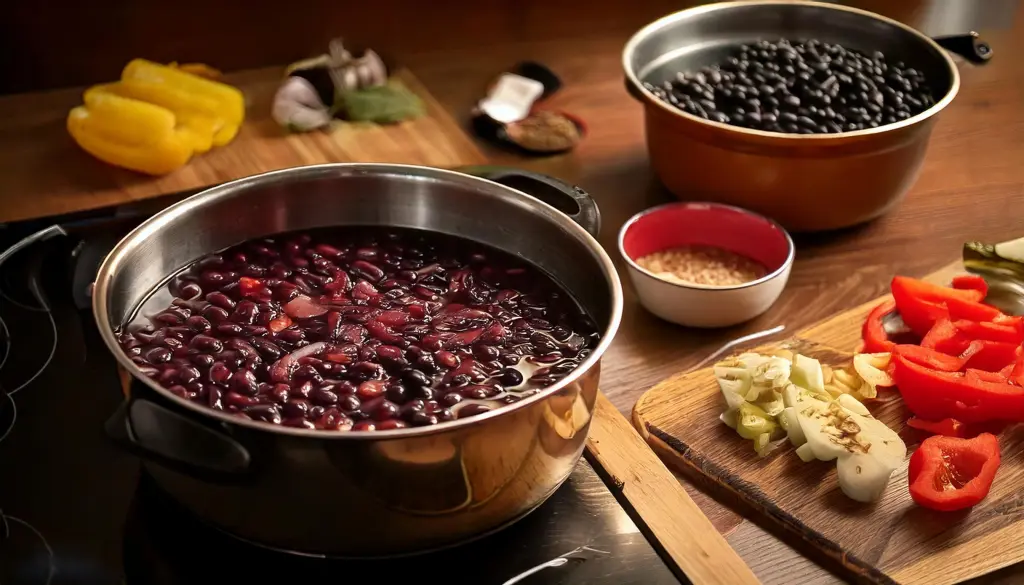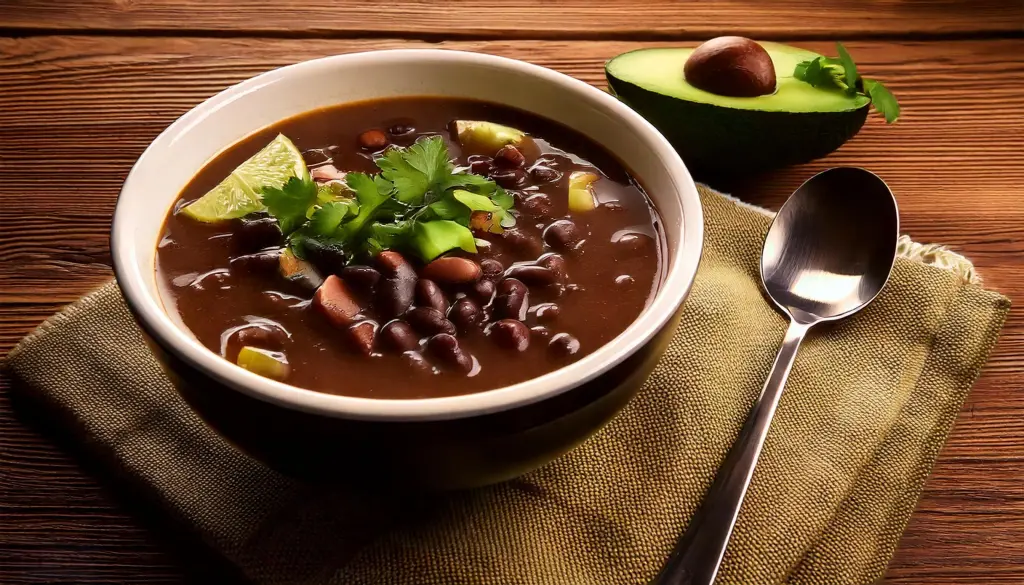Black bean soup is a comforting dish that’s packed with flavor when it’s done right. But when your soup tastes bitter, it can ruin the whole experience, right? This bitterness can sneak in for several reasons, but the good news? You can fix it and even prevent it next time! This article dives into all the possible culprits, quick fixes, and practical tips to make your black bean soup the delicious meal it’s meant to be. Let’s get started!
Common Reasons for Bitter-Tasting Black Bean Soup
Why Does My Black Bean Soup Taste Bitter?
Nobody enjoys that unpleasant, lingering bitterness in soup. So, what causes it? Here are the most frequent reasons your black bean soup might be leaving a bitter taste behind:
Overcooked or Burnt Ingredients
One of the top offenders is overcooking or burning your ingredients especially garlic and onions. These foundational elements, when scorched, develop a harsh, unpleasant flavor that spreads throughout the soup. Always sauté them gently and keep the heat in check.
Using Bitter or Old Ingredients
Did you know that some vegetables naturally bring bitterness to the pot? For example, green bell peppers, if not balanced properly, can overpower the soup. Similarly, old or improperly stored black beans may have absorbed rancid flavors. Freshness matters!
Too Much Bitter Seasoning
While spices like cumin and bay leaves are flavor powerhouses, overdoing them can make your soup taste more bitter than you’d like. Remember, moderation is key to getting those spices to shine without taking over.
Improper Cooking Techniques
Cooking on too high a heat can extract bitter compounds from certain ingredients. Beans, for instance, release tannins, which are natural compounds responsible for some bitterness. Slow and steady wins the race when it comes to simmering.
Pro tip: If you’re curious about the science behind bitterness in cooking, check out this resource on food chemistry for a deeper dive!
Quick Fixes for Bitter Black Bean Soup
How to Fix Bitter Black Bean Soup: Simple and Quick Solutions
Alright, so your soup’s turned out bitter but don’t fret! The good news is that there are easy ways to salvage it. Below are tried-and-tested solutions to balance that bitterness and bring your soup back to life:
Balancing Flavors with Acidity
When life gives you bitter soup, grab a lime! Adding a splash of acidic ingredients like lime juice or vinegar can work wonders. These ingredients cut through the bitterness and brighten the overall flavor. Not a fan of lime? A little squeeze of lemon or a dash of apple cider vinegar can do the trick.
Sweeten Things Up
A touch of sweetness can go a long way to neutralize bitter flavors. Add a small pinch of sugar, honey, or even maple syrup but be cautious. You don’t want a dessert soup! Start with a tiny amount, taste, and adjust as needed.
Neutralize Bitterness Naturally
Another quick fix is tossing in a peeled potato or a slice of bread while the soup simmers. These absorb some of the bitter compounds, making the flavor more palatable. After 10–15 minutes, remove the potato or bread and enjoy the smoother taste.
Blend for Flavor Harmony
Blending isn’t just about texture; it’s also a secret weapon for balancing flavors. If your soup tastes bitter, puréeing it helps distribute the bitterness evenly and softens those overpowering notes.
Let It Rest and Mellow
Sometimes, time is your best friend. Allow your soup to cool, refrigerate it overnight, and reheat it the next day. The rest period gives flavors a chance to meld together, often reducing bitterness naturally.
Preventing Bitterness in Black Bean Soup

How to Prevent Bitter Black Bean Soup: Pro Tips for Success
Let’s face it prevention is better than cure, especially in the kitchen! While fixing bitterness is handy, wouldn’t it be great to avoid the issue altogether? Here’s how you can keep your black bean soup smooth, savory, and perfectly balanced from the start:
Choose High-Quality Ingredients
Your soup is only as good as what goes into it. Always use fresh black beans preferably dried beans soaked overnight or canned beans from trusted brands. Avoid beans that have been sitting in your pantry for too long as they may develop off flavors.
Properly Rinse Your Ingredients
If you’re using canned beans, don’t skip the rinse. Canned beans often come packed in liquid that contains preservatives and salt, which can sometimes have a metallic or bitter taste. Rinsing them under cold water removes this layer and leaves you with clean, ready-to-cook beans.
Master the Sauté Step
When you’re cooking onions, garlic, or other aromatics, sauté them over medium heat until they’re translucent and fragrant. Over-browning these ingredients releases bitter compounds that can permeate the soup. Watch closely and keep stirring!
Balance Bitter Ingredients with Other Flavors
If your recipe includes naturally bitter vegetables like green bell peppers or kale, pair them with sweet or tangy counterparts like carrots or tomatoes. These contrasting flavors balance bitterness while enhancing overall depth.
Simmer Low and Slow
Cooking your soup on low heat for an extended time is the key to letting flavors blend beautifully without the risk of burning. It also reduces the release of tannins and other compounds that can cause bitterness.
Add Spices Wisely
While spices bring personality to your soup, they can also be overpowering if overused. For instance, a heavy hand with cumin can turn your soup bitter. Measure carefully and always taste as you go.
Finish with a Flavor Boost
Consider finishing your soup with fresh herbs like cilantro or parsley, a drizzle of olive oil, or even a dollop of sour cream. These not only enhance the flavor but also mask any lingering bitterness with a fresh, creamy finish.
In-Depth Preventative Measures
Black Bean Soup Success: Expert-Level Preventative Measures
Taking a few extra precautions can save you from the disappointment of a bitter black bean soup. These strategies go beyond basic kitchen tips, helping you master every step of the process to create a perfectly balanced soup every time.
Soak and Rinse Dried Beans Properly
When using dried beans, soaking is crucial. It not only shortens cooking time but also reduces tannins and other bitter compounds naturally present in beans. Here’s how:
- Rinse the beans thoroughly under running water to remove dirt or debris.
- Soak them overnight in a large bowl of water, ensuring at least three times the water to beans ratio.
- Drain and rinse again before cooking.
This process eliminates bitterness and ensures a clean, fresh flavor base for your soup.
Use Homemade Broth or Stock
Store-bought broths often contain preservatives and overly concentrated flavors that may contribute to bitterness. Instead, opt for homemade vegetable or chicken stock. It’s easier than you think and allows you to control the flavor balance from the start.
Season in Layers, Not All at Once
Adding all your seasonings upfront can overwhelm the soup and amplify bitter notes. Instead, add spices and salt in layers throughout the cooking process. This approach gives you better control and ensures a well-rounded flavor profile.
Monitor Heat Levels Constantly
Keeping an eye on your cooking temperature is a game changer. Avoid high heat, which can scorch your ingredients and create bitterness. A gentle simmer extracts the best flavors without any harsh aftertaste.
Include a Natural Sweet Component
Balance is key. A small, natural sweet element like carrots, sweet potatoes, or even corn can help counteract any potential bitterness from the beans or spices. Cook these ingredients alongside your beans to weave their flavors seamlessly into the soup.
Choose the Right Cookware
Believe it or not, your choice of pot can impact flavor. Non-reactive cookware like stainless steel or ceramic is best, as reactive materials like aluminum can sometimes leach metallic, bitter flavors into acidic soups.
Store and Reheat with Care
Even after cooking, bitterness can creep in if the soup isn’t stored properly. Cool your soup completely before refrigerating, and always store it in airtight, non-reactive containers. When reheating, avoid boiling; gentle warming will preserve the flavor integrity.
Understanding the Science of Bitterness in Black Bean Soup
Why Does Black Bean Soup Taste Bitter? The Science Behind It

Bitterness in black bean soup isn’t just a fluke it’s the result of natural compounds, chemical reactions, and cooking techniques. Understanding the science behind it can help you make more informed choices in the kitchen and achieve consistently delicious results.
Bitter Compounds in Black Beans
Black beans, like most legumes, contain natural compounds called saponins and tannins. These are:
- Saponins: Found in the seed coat of beans, these contribute a slightly soapy or bitter taste when not properly rinsed or cooked.
- Tannins: A type of polyphenol that adds astringency and bitterness. These are also reduced through soaking and cooking.
By addressing these compounds early in your prep, you’ll minimize their impact on the final flavor.
Overcooking Aromatics: A Common Culprit
Aromatic ingredients like garlic and onions are essential for building the flavor base of black bean soup. However, overcooking them especially at high heat can release bitter-tasting compounds like acrylamides.
To avoid this:
- Sauté aromatics gently over medium heat.
- Stir frequently to prevent burning.
- Add broth or water as soon as they soften and release their aroma.
The Role of Burnt Spices
Toasting spices can amplify their flavor, but there’s a fine line between aromatic and burnt. Burnt spices develop bitter, unpleasant notes that can dominate your soup. Keep an eye on them and toast lightly for just a few seconds.
Acidic Ingredients and Reaction with Cookware
If you’re using acidic ingredients like tomatoes or lime juice, they can react with certain cookware, particularly aluminum or cast iron, which may add a metallic bitterness. Using non-reactive cookware ensures the acidity enhances the flavor instead of causing off-putting notes.
Why Time Matters: The Bitterness of Under- or Overcooking
Undercooked beans retain more saponins, leaving behind a bitter aftertaste. On the other hand, overcooking beans or soup ingredients can break down fibers too much, releasing bitter compounds into the broth. Cooking just until tender is the sweet spot.
The Impact of Over-Salting
Salt is a key ingredient for enhancing flavors, but too much salt can amplify bitterness. This happens because bitterness and saltiness are both perceived on similar receptors in the tongue. Start with small amounts, tasting as you go.
Debunking Myths About Bitterness in Black Bean Soup
Clearing Up Common Misconceptions About Bitter Black Bean Soup
Many myths and half-truths circulate about why black bean soup might taste bitter and how to fix it. Let’s set the record straight so you can separate fact from fiction and cook with confidence.
Myth 1: Bitter Soup Means the Beans Are Old
It’s true that old beans take longer to cook and may not soften evenly, but bitterness isn’t necessarily linked to their age. Instead, bitterness is often caused by natural compounds like saponins or improper preparation, such as skipping soaking or using burnt spices.
Myth 2: Adding Sugar Fixes Everything
While sugar can balance flavors, it’s not a magical fix for bitterness. Over-sweetening your soup can distort its natural taste and overshadow its savory depth. Instead, focus on balancing all elements acid, salt, fat, and sweetness for a more nuanced flavor.
Myth 3: Bitter Soup Means Something Went Bad
Bitterness doesn’t usually mean your ingredients are spoiled. More often, it’s a result of cooking choices, like over-toasting spices or under-soaking beans. However, always check for freshness before cooking to rule out rancid or off ingredients
Myth 4: You Should Avoid Acidic Ingredients Completely
Some believe avoiding acidic elements like tomatoes or lime juice will prevent bitterness. In reality, these ingredients add brightness and balance when used properly. The key is timing adding acid near the end of cooking helps preserve its fresh flavor and prevents any metallic interactions.
Myth 5: A Blender Fixes Bitter Soup
Blending your soup may smooth its texture, but it won’t mask bitterness. If bitterness persists, it’s better to adjust the soup’s balance with a dash of acid or fat rather than relying solely on texture to fix the issue.
Myth 6: All Beans Need Baking Soda for Soaking
Baking soda is sometimes used to soften beans faster, but it can also alter their flavor. While it may reduce cooking time, it can cause an alkaline taste that might enhance bitterness. Stick to plain water for soaking unless absolutely necessary.
Myth 7: You Can’t Salvage Bitter Soup
Good news bitterness can often be remedied! As discussed earlier, balancing flavors with fat (like a dollop of cream or avocado) or acid (like a splash of lime) can save your soup. Always taste and adjust before giving up on the dish.
FAQs About Bitterness in Black Bean Soup
FAQs About Why does my black bean soup taste bitter
To wrap up, let’s tackle some frequently asked questions (FAQs) that home cooks often wonder about. These quick answers will help you troubleshoot and perfect your black bean soup recipe.
Why Does My Black Bean Soup Taste Bitter Even After Cooking?
Even after cooking, bitterness can linger if:
- You didn’t soak or rinse the beans properly.
- Burnt aromatics or spices were added early on.
- The soup wasn’t balanced with acidity, fat, or sweetness.
To fix it, try adding a squeeze of lime, a spoonful of cream, or even a small dash of sugar to mellow the bitterness.
Are Purple Beans Good to Eat?
Purple beans have recently started to make their way into the culinary spotlight, not only for their striking appearance but also for their health benefits. Read More about Benefits, Recipes & Cooking Tips
Can Soaking Beans Too Long Make Them Bitter?
Soaking beans too long (over 24 hours) can lead to fermentation, which might cause off flavors, including bitterness. Aim for an 8–12 hour soak in cold water for best results.
Is It Safe to Eat Bitter Black Bean Soup?
Yes, it’s typically safe. Bitterness is usually caused by natural compounds or cooking issues, not spoilage. However, if the soup smells rancid or tastes metallic, it’s best to discard it.
How Can I Remove Bitterness Without Starting Over?
If bitterness strikes, don’t worry! You can adjust the soup by:
- Adding a neutralizer like fat (butter, cream, or avocado).
- Balancing with a splash of lime or a small amount of sugar.
- Diluting the soup with broth to lessen strong flavors.
Does the Type of Black Bean Matter?
While most black beans are similar in taste, heirloom varieties like Black Turtle Beans may have a slightly more intense, earthy flavor. Proper preparation reduces any bitterness regardless of the type.
Can Using Canned Black Beans Cause Bitterness?
Canned beans sometimes carry a metallic or slightly bitter aftertaste due to their canning liquid. Always rinse and drain canned beans before adding them to your soup.
Do Spices Like Cumin or Chili Powder Add Bitterness?
When over-toasted or burnt, spices like cumin or chili powder can add bitter notes. Toast spices gently, just until fragrant, to avoid this issue.
Why Does My black bean Soup Taste Bitter After Blending?
Blending soup can intensify the flavors of certain ingredients, including bitterness from beans or burnt aromatics. Adjust the seasoning post-blend with acid or fat to restore balance.
Conclusion: Why does my black bean soup taste bitter?
We’ve covered a lot of ground in this guide, from identifying the causes of bitterness in black bean soup to practical ways to fix and prevent it, debunking common myths, and answering frequently asked questions. By understanding the nuances of ingredient preparation, cooking techniques, and flavor balancing, you can turn a potentially bitter bowl into a masterpiece of savory, satisfying goodness.
The key takeaway? Bitterness isn’t the end of the line for your soup it’s just a reminder to adjust and refine your cooking process. Whether it’s soaking beans properly, avoiding burnt spices, or adding a touch of fat or acid, the solutions are simple and achievable.
Now it’s your turn to apply these tips and enjoy a perfectly balanced black bean soup every time. Have fun experimenting, and don’t forget to share your results you might inspire someone else to fall in love with this comforting dish. Happy cooking! 🌟
